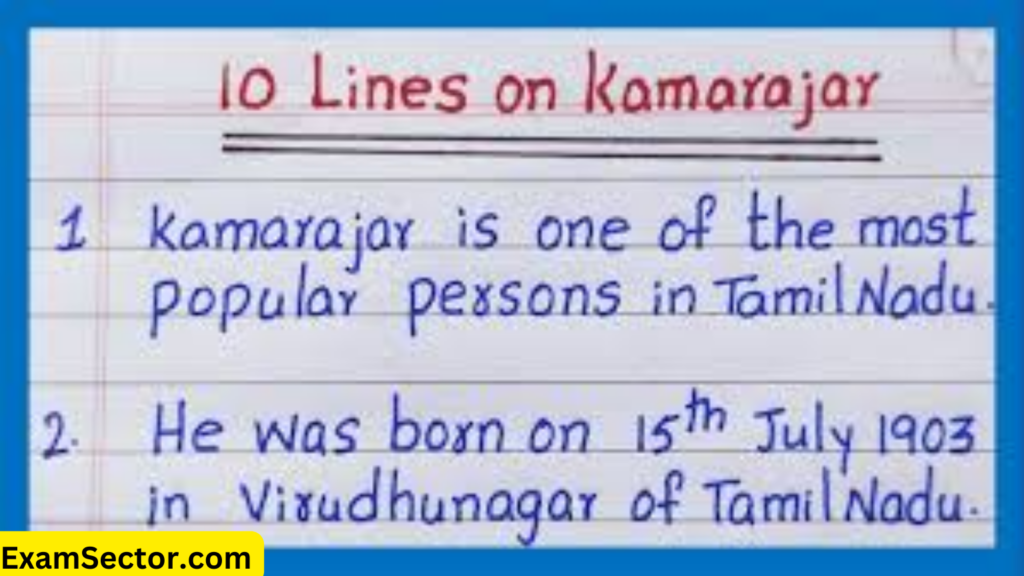
Speech on K. Kamaraj
Good morning everyone,
Today, I am honored to speak about one of the most respected leaders in Indian history, Kamaraj, commonly known as K. Kamaraj. His life and work have left an indelible mark on the political and educational landscape of India.
Early Life and Political Career
K. Kamaraj was born on July 15, 1903, in Virudhunagar, Tamil Nadu. Coming from a humble background, he experienced the struggles of ordinary people from a young age. He left school at the age of 11 to support his family but never let go of his thirst for knowledge and social justice. This early hardship shaped his empathy for the underprivileged and fueled his desire to serve the nation.
He entered politics inspired by the freedom struggle, joining the Indian National Congress in his teenage years. His dedication and organizational skills soon made him a significant figure in the . Kamaraj played a crucial role in the civil disobedience movements and was imprisoned several times by the British authorities. His commitment to the cause of Indian independence was unwavering.
Contributions as Chief Minister of Tamil Nadu
K. Kamaraj’s most notable contributions came during his tenure as the Chief Minister of Tamil Nadu from 1954 to 1963. He was a visionary leader who believed that education was the key to eradicating poverty and uplifting society. Under his leadership, Tamil Nadu saw a remarkable transformation in its educational infrastructure. He pioneered the midday meal scheme, ensuring that children from poor families received at least one nutritious meal a day at school. This not only addressed malnutrition but also significantly increased school enrollment and attendance rates.
Kamaraj’s educational reforms included the establishment of numerous schools, especially in rural areas, and the construction of thousands of classrooms. He understood that education was the foundation of a prosperous society and worked tirelessly to make it accessible to all. His efforts led to a dramatic increase in literacy rates and set the stage for Tamil Nadu’s future as a hub of education and innovation.
Political Reforms and Legacy
Apart from education, Kamaraj also focused on industrial development and agricultural reforms. He facilitated the establishment of several industries, which provided employment opportunities and boosted the state’s economy. His policies on irrigation and agriculture helped farmers improve their yields and secure better livelihoods.
Kamaraj was known for his simplicity, integrity, and dedication to public service. He was often referred to as the “Kingmaker” for his pivotal role in Indian politics during the 1960s. His decision to step down as Chief Minister to focus on strengthening the Congress party at the national level showcased his selflessness and commitment to the greater good.
Kamaraj Plan
In 1963, he proposed the “Kamaraj Plan,” urging senior Congress leaders to resign from their positions and focus on revitalizing the party. This bold move demonstrated his strategic acumen and deep understanding of political dynamics. Although the plan had mixed results, it highlighted Kamaraj’s forward-thinking approach and his ability to inspire change.
10-Line Speech on K. Kamaraj
- Today, I am honored to speak about K. Kamaraj, a remarkable leader in Indian history.
- Born on July 15, 1903, in Tamil Nadu, he was a key figure in the Indian freedom struggle.
- Kamaraj joined the Indian National Congress at a young age and was imprisoned several times for his participation in civil disobedience movements.
- As Chief Minister of Tamil Nadu from 1954 to 1963, he implemented transformative educational reforms.
- He introduced the midday meal scheme, significantly increasing school enrollment and attendance.
- Kamaraj established numerous schools and classrooms, making education accessible to all, especially in rural areas.
- His focus on industrial development and agricultural reforms boosted the state’s economy and improved farmers’ lives.
- Known as the “Kingmaker,” he played a pivotal role in national politics and proposed the “Kamaraj Plan” to rejuvenate the Congress party.
- Kamaraj’s simplicity, integrity, and dedication to public service remain an inspiration.
- His legacy as a visionary leader continues to impact Tamil Nadu and India, reminding us of the power of selfless leadership.
Speech on Kamarajar in English – 2024 Conclusion
K. Kamaraj passed away on October 2, 1975, but his legacy lives on. His contributions to education, agriculture, and industrial development have left an enduring impact on Tamil Nadu and India as a whole. He remains a symbol of integrity, dedication, and visionary leadership.
As we remember Kamaraj today, let us be inspired by his life and work. Let us strive to uphold the values he stood for and work towards a society where education, equality, and opportunity are accessible to all.
The post appeared first on .
